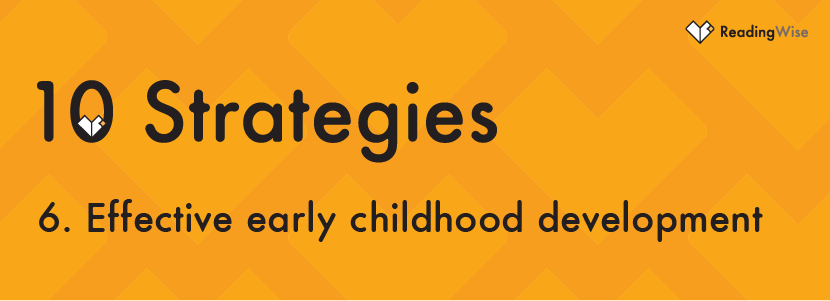
Strategy No 6: Effective early childhood development
As we said in our previous blog, providing a literacy-rich environment in the home is one of the best ways to ensure children get off to a flying start with reading. But what does such an environment look like? The short answer is: middle-class.
Even before they are born, children of middle-class parents have typically gained an advantage over their less fortunate peers. Their parents are more likely to provide the right conditions for effective early learning to take place to have a high regard for books.
Numerous studies in the UK, the United States and elsewhere, have shown that early learning activities in the home help to boost children’s academic performance once they start primary school.
The highly influential Effective Provision of Pre-school Education project (EPPE) - which has done so much to shape pre-school provision in the UK over the last decade - has shown that middle-class parents are far more likely to provide rich learning activities in the home. These include:
- Reading with children every day
- Taking them to the library
- Engaging them in oral language games and songs
- Teaching them about letters and numbers (for instance by using plastic letters on the fridge)
These activities are much less common in disadvantaged families with the result that children from less favoured backgrounds start primary school “much less prepared and able to begin the formal study of phonics”.
The good news is that effective early childhood support can have a considerable impact in mitigating these disadvantages. As the EPPE study notes: what parents do with their children is more important than who their parents are.
“Poor mothers with few qualifications can improve their children’s progress and give them a better start at school by engaging in activities at home that engage and stretch the child’s mind,” the study concludes.
This finding underlines the importance of providing programmes by Sure Start children’s centres – there are now over 3,000 of them across England - to provide support for disadvantaged families.
Some of the best work from these programmes is described in a recent report by the All Party Parliamentary Sure Start Group (Best Practice for a Sure Start: the Way Forward for Children’s Centres, 2013). The report notes that Sure Start centres have ‘never been more valuable’ in reducing early disadvantages and increasing children’s readiness to start school.
One of its key recommendations is that children’s centres should increase their focus on providing advice and support for expectant parents and for families with babies and toddlers.
It also recommends that children’s centres should:
- Support and encourage parents to play with their babies and children, emphasising the benefits of talking to and praising them
- Provide or promote singing and story sessions which encourage parents to sing with their babies and children and promote the benefits of reading
- Encourage parents at ante and post-natal sessions to speak to their babies, particularly in affectionate tones.
These activities are intended to help parents and carers provide the sort of early childhood nurturing typically found in middle-class homes. The aim is to help less advantaged children develop the language, comprehension and listening skills they need to become effective readers and writers once they start primary school.
Teachers know the reason why many children struggle with learning to read once they start school is because they have poor language and listening skills. They have little knowledge of books, nursery rhymes or fairy stories and often struggle to speak in sentences.
If we are to create world-class literacy in our schools, an essential prerequisite is providing literacy-rich environments for all children from the day they are born. That doesn’t just mean helping parents to read to their babies. It’s also about providing resources for libraries and establishing reading and writing areas for pre-school children and parents in public spaces such as GP surgeries and health centres.
While none of this is cheap, we know providing help and support for families that need it can successfully reduce educational disadvantage. The EPPE study shows that, while children of middle-class parents are significantly ahead of their less fortunate peers when they start pre-school, the gap between them has narrowed by the time they start primary school.
While not eliminating the differences attributable to social backgrounds completely, effective pre-school and other programmes for children in the early years can significantly reduce disadvantages and reduce the need for costly literacy interventions once they start primary school.
Next week: Reading for pleasure – Strategy No 7 in our series examines how children can develop a love of books by emphasising the joys of reading and giving them access to a wide range of texts









